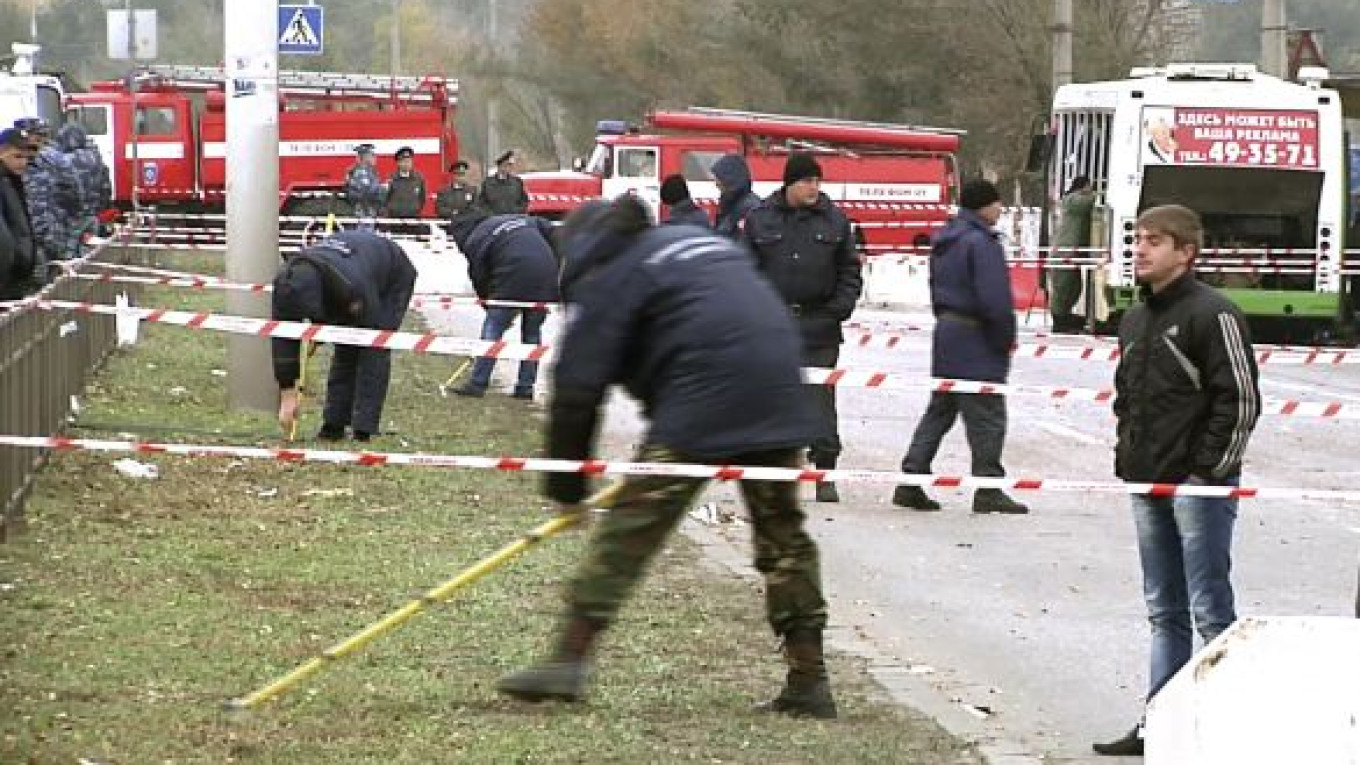VOLGOGRAD — Security forces hunted Tuesday for the husband of a suicide bomber a day after she blew herself up on a bus in southern Russia, killing six people and wounding more than 30 others. They also raised the possibility that Moscow, not Volgograd, was the bomber's original target.
Investigators say 30-year-old Naida Asiyalova, a native of the volatile republic of Dagestan in the North Caucasus, was married to an ethnic Russian man who had joined Islamic militants. They say her husband, Dmitry Sokolov, has become a top rebel expert in explosives and could have been involved in equipping his wife for the suicide mission.
Sokolov has been on the run since he left his home in a Moscow suburb in the summer of 2012.
The bombing Monday in the southern Volgograd region was the first attack against a civilian target outside the volatile North Caucasus region in years, raising fears of a new wave of terror just 3 1/2 months before the start of the 2014 Winter Games in Sochi.
In Ufa on Tuesday, President Vladimir Putin accused foreign rivals of using radical Islam to weaken the Russian state.
"Some political forces use Islam, the radical currents within it … to weaken our state and create conflicts on Russian soil that can be managed from abroad," Putin said at a meeting with Muslim clerics.
He did not say which foreign rivals he was referring to.
Volgograd lies 650 kilometers northeast of the North Caucasus, where an Islamic insurgency has been simmering for more than a decade after two separatist wars in Chechnya. In Dagestan, the center of the insurgency, bombings and shootings occur almost daily. The Tsarnaev brothers, accused of carrying out the Boston Marathon bombings, have roots in Dagestan and Chechnya.
It was not clear why Asiyalova chose to target Volgograd, as she had a ticket for Moscow, authorities said.
Vladimir Markin, the spokesman for the Investigative Committee, said authorities were trying to determine whether Asiyalova had planned her attack in Volgograd or made an impromptu choice along the way. He said Asiyalova took a Moscow-bound bus from Dagestan, but left it in Volgograd and took a local bus, where she detonated her explosives Monday.
The bomb was rigged with shrapnel, which caused severe injuries and left many of the wounded in grave condition. Most of the passengers were students coming home after lessons.
Dmitry Yudin, a student who suffered a concussion and arm wound, said he had noticed Asiyalova when she boarded the bus because she wore a dark Islamic headscarf. He said the suspected attacker looked "calm and collected" and kept a low profile.
Rasul Temirbekov, a spokesman for the Investigative Committee's regional branch in Dagestan, said Asiyalova met Sokolov, a university student, in Moscow and recruited him to join the rebels in Dagestan. He studied Islam and Arabic, took the nom de guerre of Abdul Jabbar and quickly gained a reputation with the militants.
Investigators believe Sokolov had prepared explosives for a suicide bomber who blew herself up outside the regional branch of Russia's Interior Ministry in Dagestan in May, killing 12 people.
Temirbekov said Asiyalova had a fatal bone illness, but her mother countered that, telling Izvestia that her daughter had some stomach problems after taking diet pills but nothing serious.
Ravzat Asiyalova also said her daughter became strongly religious three years ago. She told Izvestia that she disapproved of that and her daughter rarely called her, mainly to avoid arguments.
In an apparent retaliation for Monday's bombing, unidentified attackers threw firebombs late Monday at a Muslim prayer house in Volgograd, police said. A custodian managed to put out the fire.
Material from Reuters is included in this report.
A Message from The Moscow Times:
Dear readers,
We are facing unprecedented challenges. Russia's Prosecutor General's Office has designated The Moscow Times as an "undesirable" organization, criminalizing our work and putting our staff at risk of prosecution. This follows our earlier unjust labeling as a "foreign agent."
These actions are direct attempts to silence independent journalism in Russia. The authorities claim our work "discredits the decisions of the Russian leadership." We see things differently: we strive to provide accurate, unbiased reporting on Russia.
We, the journalists of The Moscow Times, refuse to be silenced. But to continue our work, we need your help.
Your support, no matter how small, makes a world of difference. If you can, please support us monthly starting from just $2. It's quick to set up, and every contribution makes a significant impact.
By supporting The Moscow Times, you're defending open, independent journalism in the face of repression. Thank you for standing with us.
Remind me later.


